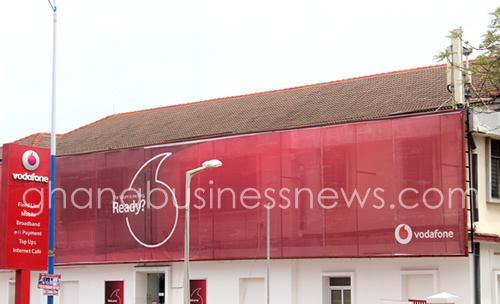 The Ghana Revenue Authority (GRA) has filed an affidavit in opposition to a motion filed by Vodafone Ghana against it at the Commercial Division of the High Court of Justice in Accra, describing it as ill-conceived and misplaced.
The Ghana Revenue Authority (GRA) has filed an affidavit in opposition to a motion filed by Vodafone Ghana against it at the Commercial Division of the High Court of Justice in Accra, describing it as ill-conceived and misplaced.
It will be recalled that last month, ghanabusinessnews.com reported that Vodafone Ghana has filed a motion against the GRA, disputing tax assessments of GH¢160 million. The GRA has asked Vodafone to pay 30 per cent of the stated assessment while negotiations continue, as required by the law, but Vodafone says it won’t pay.
Vodafone’s contention is that in July 2017, the Transfer Pricing Unit of the GRA conducted a Transfer Pricing audit of the company for the 2012 – 2016 years of assessment. But Vodafone disagreed with the GRA’s use of the Technology Transfer Regulation, 1992 (L.I. 1547) instead of the Transfer Pricing Regulations, 2012 (L.I. 2188) in the audit exercise, according to Court documents obtained by ghanabusinessnews.com.
In a back and forth correspondence between the two, the GRA counteracts Vodafone’s assertions by arguing that after subjecting the company’s transactions to the Technology Transfer Regulation 1992, (L.I. 1547), it established that the transactions do not meet the Arm’s Length Test.
Officials of Vodafone said they perceive the conducts of the GRA in assessing the company’s tax obligations as arbitrary and harassing, and has therefore filed a motion at the Commercial Court. The court was to have sat on the case on Wednesday October 11, 2017, but the GRA filed an affidavit in opposition.
The telecoms provider is asking the Court to compel the Commissioner-General to determine its request for a waiver of the said payment of 30 per cent of the total valued of assessed tax liabilities which is to the tune of GH¢49 million.
In response to the motion filed by Vodafone Ghana, an affidavit in opposition was filed on Tuesday October 10 by Mr. Kwame Owusu, head of the Transfer Pricing Unit of the Ghana Revenue Authority – just a day before the court’s scheduled sitting on Wednesday October 11 – adjourning hearing to Wednesday October 18, 2017.
The document states that Vodafone objected to an audit report with a tax assessment dated August 8, 2017, raised on it by GRA. It pointed out that Vodafone is required by section 42(5)(b) of the Revenue Administration Act 2016, (Act 915) to pay 30 per cent of the disputed tax before an application of objection can be entertained, and Vodafone Ghana was duly notified of this statutory requirement, upon receipt of application for objection.
The affidavit indicates that Vodafone Ghana applied to the GRA under section 42(6) of the Revenue Administration Act 2016, (Act 915) to waive the payment of the 30 per cent, but also states that section 42(7) of the Revenue Administration Act 2016, (Act 915) sets out the issues to be considered by the GRA in determining an application for a waiver.
The affidavit states that in the light of section 42(7), the GRA wrote to Vodafone that it was yet to consider whether to exercise the power under section 42(6) of Act 915, noting that under section 43(2) of Act 915, the Authority has 60 days upon receipt of an objection to a tax decision to make a determination of the objection, but 26 days after filing its objection and 19 days after the request for a waiver of the 30 per cent, Vodafone Ghana filed for application to quash a decision that had not been made and to compel the making of a decision for which the statutory period had not expired.
In the affidavit, the GRA describes Vodafone’s application to invoke the supervisory jurisdiction of the court as premature, owing to the fact that it was filed on September 13, 2017, 26 days from the date of receipt of Vodafone’s objection to the tax assessment raised on it.
The GRA contends further that the transfer pricing audit of Vodafone Ghana is still ongoing which necessitated the Respondent’s request for information dated on August 21, 2017, adding,” that the request for further information with respect to the Transfer Pricing Audit ‘in order to facilitate the audit process’ is different from the Audit and tax assessment of GH¢162, 468, 361.90 under the Technology Transfer Regulations, 1992 (L.I. 1547).”
The GRA argues further that the application to court by Vodafone Ghana, is clearly an attempt to avoid satisfying the conditions imposed by law for a determination of its objection against a tax decision.
Among others, the GRA states that Certiorari will not lie in the instant application absent a decision on the basis on which an order for certiorari must be determined, that Vodafone’s application for Mandamus is ill-conceived and misplaced. That it is the GRA’s case that there has been no such decision by him (Commissioner-General) to not exercise power to consider Vodafone’s application for a waiver.
By Emmanuel K. Dogbevi & Solomon Otu Mensah
Copyright ©2017 by Creative Imaginations Publicity
All rights reserved. This news item or any portion thereof may not be reproduced or used in any manner whatsoever without the express written permission of the publisher except for the use of brief quotations in reviews.
